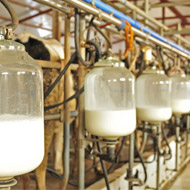Dairy farmers in England to receive £15.5m

Overall, the UK has been awarded an aid package of £26.2m - the third largest allocation of all the member states.
Dairy farmers in England will receive emergency funding of £15.5 million, environment secretary Liz Truss has announced.
Farmers are to receive a one-off payment based on milk production, which works out at £1,820 per farmer on average.
The pay-out forms part of an EU support package worth €500m in total. It aims to help farmers cope with cash-flow problems as a result of low milk prices.
Overall, the UK has been awarded an aid package of £26.2m - the third largest allocation of all the member states.
Of this Northern Ireland will receive £5.1m, Wales £3.2m and Scotland £2.3m.
Liz Truss commented: "We recognise that many dairy farmers are suffering financial difficulty at the moment and the support announced today will offer some relief.
"Dairy farmers are a vital part of our £100 billion food and farming industry. I want to support the industry to become more resilient and ready to take advantage of the growing demand for British dairy both at home and overseas."



 HMRC has invited feedback to its communications regarding the employment status of locum vets and vet nurses.
HMRC has invited feedback to its communications regarding the employment status of locum vets and vet nurses.